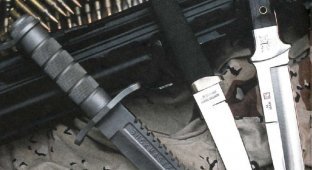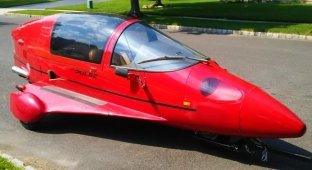A combat knife is designed taking into account its priority function - destroying the enemy. The design of these weapons varies depending on the requirements of a particular special unit, but, ideally, a combat knife should meet several basic requirements that allow a fighter to use it in the most effective way. In this article we will present ten types of the most famous and most popular combat knives, which are still in service with some

Navaja
This Spanish knife became a real symbol of revenge - it was used by hot southern guys to explain to the enemy who was really right here. The navaja was invented by peasants in order to circumvent the existing ban on long blades. The knife is unfolded manually; there is a lock on the butt, which became the prototype of the modern backlock.

Bowie knife
A typical weapon of the modern redneck, invented by a veteran of the Texas Revolution, Colonel James Bowie. This huge cleaver, with a cross-shaped guard, was loved to be carried by Crocodile Dundee in the film of the same name. A knife is not very convenient to use as a combat weapon - unless you are suddenly transported to the Middle Ages, where you simply cannot do without a sword

Machete
And another gift from sunny Spain: a machete - a wide, long cleaver with a one-sided sharpening. Such a thing is equally convenient for clearing a path in the thickets and cutting off the heads of enemies. During the Vietnam War, machetes were widely used by American soldiers: army cutlasses had a hollow handle for a ground strike and a serrated handle.

Karambit
The knife is designed to solve only one task - killing the enemy. The karambit is equipped with a sickle-shaped blade with internal sharpening. The correct grip is reverse; for convenience, there is a special ring on the handle for the index finger. The blade is not long, so it is convenient to carry this murder weapon in your pocket.

Balisong
The famous “butterfly knife”, an indispensable attribute of every yard guy from the 90s. In the Philippines, balisong is actively used in knife fighting schools. Opening a knife is a separate song, performed by some craftsmen with truly circus antics.

Bolo
During the Philippine Revolution, the bolo knife experienced a real renaissance. This agricultural tool, convenient for cutting down thickets, turned into a terrible nightmare for the soldiers of the American army. The bolo has a reverse sharpening and a curved blade - in appearance it is a cross between a machete and a kukri.

Kukri
The famous kukri, the military weapon of the Nepalese Gurkhas, looks more like a medieval instrument of mass murder. The blade has an internal sharpening and a reverse bend; the owner of a genuine kukri tries to never part with the knife. For Gurkhas, kukri is a specific symbol indicating that the owner belongs to the warrior caste.

Tanto
The history of this knife dates back to the beginning of the Middle Ages. Tanto remained the last argument of the samurai: a shortened blade, conveniently hidden in a bamboo sheath, often decided the course of the battle. The usual length of the blade is 30 centimeters, sharpening can be either single-sided or double-sided.

Quiken
The cutting edge of a quaiken blade can be compared to a razor blade. Quiken was and is carried for self-defense; the knife is ideal for concealed carry.

Spike knife
Most likely, the ancestor of the push dagger, or butcher knife, was the Indian Qatar. This weapon became popular during the Gold Rush - then the knife was considered the “last chance” of a gold miner. It's difficult to use for anything other than self-defense, but it does its job well.























